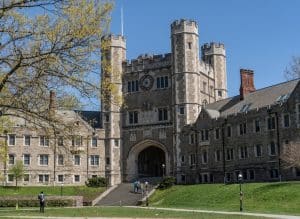Does Princeton Offer Early Action?
As high school seniors begin the grueling task of college applications, common questions often crown their minds. One of those queries potentially being, “Does Princeton offer Early Action?” To provide clarity on this topic, this article is designed to explore Princeton University‘s Early Action offerings, dissect its admission policies and processes, and offer key tips for applying.
Understanding Early Action
Before diving into the specifics of Princeton’s admission policies, it’s important to first understand what Early Action actually is. It plays a crucial role in the college application process, and knowing its implications can alter one’s approach.
Early Action (EA) refers to an application process where students apply to a college of their choice earlier than the regular admission deadline. With EA, students typically send out applications in November, as opposed to the Regular Decision (RD) deadline, which usually falls in January.
The primary distinction of Early Action is that it’s non-binding; students are not obligated to attend the college if they are accepted. This gives students the opportunity to compare financial aid packages from different universities before making a commitment.
However, Early Action does not guarantee admission. It simply allows students to receive an admission decision earlier, providing them with more time to plan and make informed decisions about their future. It’s important for students to carefully consider their options and weigh the pros and cons before deciding to apply for Early Action.
The Benefits of Early Action
There are several advantages that come with applying for Early Action. For one, students receive admission decisions much sooner, often by December. This can help alleviate some of the stress associated with waiting for responses.
Additionally, applying Early Action gives students an edge as the acceptance rates during this period are typically higher than in the Regular Decision pool. That said, it’s important to note that those who apply early often boast stronger academic records and more impressive application materials overall.
Another benefit of Early Action is that it allows students to demonstrate their genuine interest in a particular college. By applying early, students show their enthusiasm and dedication to the institution, which can positively impact the admission decision.
Moreover, applying Early Action can also provide students with an opportunity to receive early scholarship notifications. Many colleges offer merit-based scholarships to their Early Action applicants, giving students a financial advantage.
Furthermore, Early Action allows students to start planning for their college experience earlier. They have more time to research and visit potential colleges, attend information sessions, and connect with current students or alumni. This early engagement can help students make more informed decisions about their college choices.
Lastly, applying Early Action can also be beneficial for students who are unsure about their college preferences. By applying early, they can secure an admission offer from one of their top choices while still keeping their options open for Regular Decision applications.
Princeton University’s Admission Policies
Moving onto Princeton, let’s delve into the university’s specific admission policies. As an Ivy League institution, Princeton maintains a highly competitive admission process.
Overview of Princeton’s Admission Process
Princeton University assesses candidates based on a holistic review—this means that every part of the application is considered. This includes academic performance, standardized test scores, application essays, letters of recommendation, as well as extracurricular activities.
When it comes to academic performance, Princeton looks for students who have challenged themselves with rigorous coursework, such as Advanced Placement (AP) or International Baccalaureate (IB) classes. The university values intellectual curiosity and a passion for learning, so it’s important for applicants to demonstrate their academic potential.
Standardized test scores, such as the SAT or ACT, are also taken into consideration. While Princeton does not have a strict cutoff for these scores, competitive applicants often have scores in the top percentile. However, it’s worth noting that Princeton has adopted a test-optional policy for the 2021-2022 and 2022-2023 application cycles due to the COVID-19 pandemic.
The application essays provide an opportunity for applicants to showcase their personal experiences, values, and aspirations. Princeton looks for essays that are well-written, authentic, and reflective of the applicant’s voice. It’s important for applicants to use this space to tell their unique stories and highlight their individuality.
Letters of recommendation play a significant role in the admission process as well. Princeton encourages applicants to submit letters from teachers, counselors, or mentors who can speak to their academic abilities, personal qualities, and potential for success at the university.
Extracurricular activities are another important aspect of the application. Princeton values students who have made meaningful contributions to their communities and have pursued their passions outside of the classroom. Whether it’s through leadership roles, community service, artistic endeavors, or athletic achievements, applicants are encouraged to highlight their involvement and impact.
Additionally, students who wish to enroll in Princeton are encouraged to have an alumni interview, which can provide further insight into their character, passions, and suitability for the university. These interviews offer applicants the chance to engage in a conversation with a Princeton graduate who can assess their fit within the university’s community.
Regular Decision at Princeton
Princeton’s Regular Decision application deadline is usually at the beginning of January, with admission decisions typically released in late March. As for Early Decision, however, the road is a bit more winding.
Early Decision applicants to Princeton must submit their applications by November 1st, and they receive their admission decisions in mid-December. This binding application option is designed for students who have identified Princeton as their top choice and are committed to attending if accepted. Early Decision applicants are expected to withdraw applications from other colleges and universities upon acceptance to Princeton.
Princeton’s Early Decision program is highly competitive, with a lower acceptance rate compared to Regular Decision. The university looks for students who not only demonstrate exceptional academic abilities but also align with Princeton’s values and mission.
It’s important for applicants to carefully consider their options and conduct thorough research before deciding to apply for Early Decision. While it can increase the chances of admission, it also requires a firm commitment to attending Princeton if accepted.
Overall, Princeton University’s admission process is rigorous and highly selective. The university seeks students who not only excel academically but also exhibit intellectual curiosity, leadership potential, and a genuine passion for learning. By considering every aspect of the application, Princeton aims to create a diverse and talented student body that will thrive in its challenging academic environment.
Early Action at Princeton: A Closer Look
Pulling into focus Princeton’s specifics regarding Early Action can be quite revelatory. The university has had a complex relationship with Early Action throughout its history.
The History of Early Action at Princeton
Princeton University first introduced its Early Action program in the 1970s. This decision was made in response to the growing demand from high school seniors who wanted to receive their admission decisions earlier in the application process. The introduction of Early Action provided students with the opportunity to apply to Princeton and receive a decision before the regular admission cycle.
However, in 2006, the university decided to discontinue Early Action in an effort to diversify the student body. The rationale behind this decision was to ensure that all applicants, regardless of their socioeconomic background, had an equal chance of gaining admission to Princeton. By eliminating Early Action, the university aimed to level the playing field and create a more equitable admissions process.
Then, in 2011, Princeton University reinstated the Early Action program. The decision to bring back Early Action was driven by the realization that the abolishment of the program didn’t have the desired effect on student diversity. The university recognized that Early Action could still be a valuable tool in attracting a diverse pool of applicants while also providing students with the opportunity to receive an early admission decision.
Current Status of Early Action at Princeton
As of now, Princeton University does offer an Early Action program. Students who wish to apply early to Princeton are required to submit their applications by early November. This allows the admissions committee ample time to review the applications and make informed decisions. Decision letters for Early Action applicants are generally sent out in mid-December, providing students with an early indication of their admission status.
However, Princeton’s Early Action program is somewhat unique—it’s a Single-Choice Early Action (SCEA) program. In an SCEA program, students can apply early only to Princeton. This means that while they are still allowed to apply to other colleges via the Regular Decision process, they cannot apply early to any other institution.
This Single-Choice Early Action program at Princeton provides students with the flexibility to explore other college options during the regular admission cycle while still demonstrating their strong interest in Princeton. It allows students to carefully consider their college choices and make an informed decision about where they would like to attend.
Furthermore, the SCEA program at Princeton ensures that the university receives a committed pool of applicants who are genuinely interested in attending. This helps the admissions committee in their selection process, as they can focus on applicants who have demonstrated a strong desire to be part of the Princeton community.
Overall, Princeton University’s Early Action program has evolved over the years, reflecting the university’s commitment to diversity and providing students with a fair and transparent admissions process. The reintroduction of Early Action, in the form of Single-Choice Early Action, has allowed Princeton to attract a diverse pool of applicants while still giving students the opportunity to explore their college options.
Comparing Early Action Policies: Princeton vs. Other Ivy League Schools
Understanding Princeton’s Early Action (EA) policy becomes even more interesting when contrasted with the policies of other Ivy League universities. Exploring the differences and similarities between these prestigious institutions sheds light on the complexities of the college admissions process.
Early Action Policies at Harvard, Yale, and Stanford
Like Princeton, Harvard, Yale, and Stanford also follow a Single-Choice Early Action (SCEA) policy for their early applications. This means that students can apply early to these universities without committing to attend if accepted. However, the nuances of each university’s policy set them apart.
Harvard, for instance, has a restrictive Early Action policy, which means that applicants cannot apply to any other private college or university under an early program. On the other hand, Yale and Stanford have non-restrictive Early Action policies, allowing students to apply to other schools early as well.
Regarding deadlines, Harvard and Princeton have similar EA deadlines, usually in early November. Yale and Stanford, however, have slightly later deadlines, typically in mid-November.
How Princeton’s Policies Differ
Princeton has the unique distinction of having retracted and then reinstated their Early Action policy. In 2011, the university decided to eliminate its Early Action program in an effort to make the admissions process more equitable. However, after careful evaluation and consideration, Princeton reintroduced Early Action in 2018.
Princeton is also known for its rigorous review process. The university takes a holistic approach to evaluating applicants, considering not only academic achievements but also personal qualities, extracurricular involvement, and potential contributions to the campus community.
Another notable difference is Princeton’s emphasis on alumni interviews. While alumni interviews are offered by most Ivy League institutions, Princeton places a relatively higher importance on them. The university believes that these interviews provide valuable insights into an applicant’s character and fit for the Princeton community.
Furthermore, Princeton has a strong commitment to need-blind admissions, ensuring that a student’s financial circumstances do not influence the admission decision. This policy aligns with the university’s dedication to creating a diverse and inclusive student body.
Overall, while Princeton shares similarities with other Ivy League schools in terms of their SCEA policy, it stands out with its unique history, rigorous review process, emphasis on alumni interviews, and commitment to need-blind admissions. Understanding these distinctions can help prospective students navigate the college application process more effectively.
How to Apply to Princeton
Considering applying to Princeton? Here are some essential points you need to know.
Application Requirements and Deadlines
Alongside an online application, Princeton requires multiple supplemental essays, letters of recommendation from teachers and a counselor, official school reports, SAT or ACT scores, and for some majors, a Graded Written Paper. The deadline for SCEA is usually early November.
Tips for a Successful Princeton Application
Above all else, authenticity is key to a successful Princeton application. Demonstrate genuine enthusiasm for your chosen major, showcase intellectual vitality, and provide a clear picture of your identity and experiences.
Remember, Princeton practices a rigorous holistic review, so it’s essential to make every part of your work as strong as it can be. Proper preparation and a thorough understanding of Princeton’s specific requirements will significantly increase your chances of being accepted.
Final Thoughts
While the college application process can be overwhelming, understanding the nuances of each school’s policies will serve you well. Yes, Princeton does offer Early Action, though it’s a distinctive Single-Choice process. Making the most of this opportunity can set the foundation for a rewarding academic journey at one of the world’s foremost institutions.
How AdmissionSight Can Help You With College Admissions
AdmissionSight is a college consulting firm that provides personalized assistance to students throughout the college admissions process. Here are some ways that AdmissionSight can help you:
Admissions strategy: AdmissionSight can help you develop a strategic plan for your college application process. Our professional consultants can assist with identifying schools that are a good fit for your academic, extracurricular, and personal goals and help you plan and prioritize your application strategy.
Application review: AdmissionSight can review your application and provide feedback on how to improve it. We can offer suggestions on making your application stand out and highlighting your strengths and unique qualities.
Essay coaching: AdmissionSight can help you craft compelling essays that showcase your personality, goals, and achievements. We can guide you through the essay writing process and provide feedback on your drafts to help you refine your writing.
Interview preparation: AdmissionSight can provide interview coaching to help you feel confident and prepared for college interviews. Our experts can offer tips on how to present yourself professionally and how to answer common interview questions.
Extracurricular planning: AdmissionSight can help you plan and develop your extracurricular activities to make them more impactful and meaningful. We can suggest activities that align with your interests and goals and provide guidance on demonstrating your leadership and initiative.
Overall, AdmissionSight can provide valuable guidance and support throughout the college admissions process to help you maximize your chances of getting accepted into the college of your choice.
With a high success rate of over 75%, we have built a strong network in the past decade. Book an initial consultation today, free of charge!








































